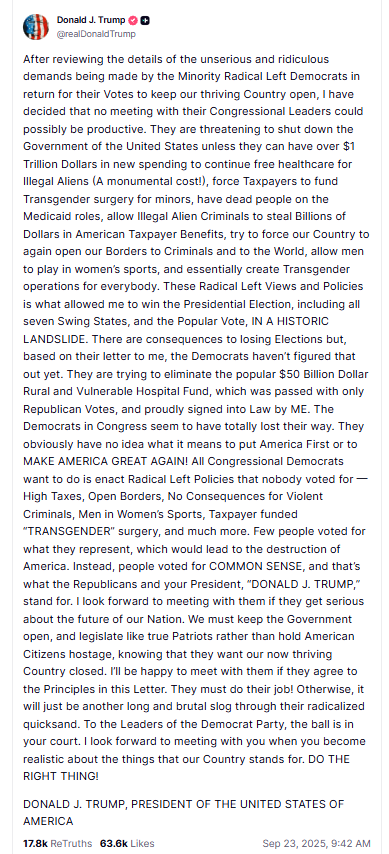Democratic leaders in Congress are drawing a red line around healthcare protections as the federal government inches toward a partial shutdown on October 1, demanding comprehensive healthcare measures in exchange for their votes on a funding extension.
President Donald Trump has not only refused to meet with Democratic leaders but has explicitly instructed House Speaker Mike Johnson and Senate Majority Leader John Thune to avoid any substantive negotiations with Democrats.
Senate Minority Leader Chuck Schumer (D-N.Y.) and House Minority Leader Hakeem Jeffries (D-N.Y.) are insisting on several key healthcare provisions as part of any government funding agreement:
Affordable Care Act Subsidies: Democrats want to permanently extend enhanced premium subsidies for Americans purchasing health insurance through ACA marketplaces, which are set to expire at the end of 2025. Without these subsidies, the Congressional Budget Office estimates that premiums could increase by 75% for many Americans, leading to over 4 million people becoming uninsured.
Medicaid Restoration: Democratic leaders are demanding the reversal of approximately $911 billion in Medicaid cuts enacted through Trump’s “One Big Beautiful Bill” earlier this year. These cuts are projected to result in 7.5 million Americans losing their Medicaid coverage by 2034, with rural hospitals and healthcare providers particularly affected.
Healthcare Infrastructure Protection: Democrats seek to restore funding for public health programs and prevent additional cuts that have already led to rural clinic closures across the country.
President Trump has effectively shut down bipartisan talks by instructing GOP leadership to avoid any meaningful negotiations with Democrats. During a Monday night phone conversation with Johnson and Thune, the Speaker reportedly urged Trump to call off scheduled discussions with Democrats over concerns it would erode Republican leverage.

Following this call, Trump abruptly canceled a planned White House meeting with Schumer and Jeffries that had been scheduled for Thursday, posting on Truth Social: “After reviewing the details of the unserious and ridiculous demands being made by the Minority Radical Left Democrats in return for their Votes to keep our thriving Country open, I have decided that no meeting with their Congressional Leaders could possibly be productive.”
Despite the approaching September 30 deadline, the House Speaker has canceled all votes for Monday and Tuesday of next week, sending lawmakers home when pressure for negotiations should be highest.
Senate Majority Leader Thune has refused to engage in direct talks with Schumer about funding, maintaining that there’s “nothing to negotiate” since Republicans are offering a “clean” seven-week continuing resolution.
Republicans are pushing for a “clean” seven-week continuing resolution that would fund the government through November 21 without additional policy changes. The House narrowly passed this measure on Friday, but it failed to advance in the Senate, where Republicans need Democratic support to reach the 60-vote threshold.
In their coordinated strategy, Senate Majority Leader Thune plans to force another vote on the Republican funding bill before the shutdown deadline, deliberately putting Democrats on record opposing the measure rather than seeking compromise.
Democratic leaders have responded forcefully to Trump’s directive to halt negotiations, with Schumer accusing the president of running away from the negotiating table before he even gets there and warning that Donald Trump will own the shutdown.
Healthcare policy experts warn that without action on the ACA subsidies, insurance companies will soon lock in significantly higher premium rates for 2026, making any later congressional intervention more complicated. Health insurance companies face deadlines that make congressional delay increasingly costly for consumers. With open enrollment for 2026 coverage beginning November 1, 2025, just over five weeks away, insurers have already submitted their preliminary rate filings and are now in the final stages of locking in premium rates for the upcoming year.
The Medicaid cuts are already having real-world effects, with rural healthcare providers citing the “One Big Beautiful Bill” as they announce clinic closures.
The Senate is scheduled to return on September 29, leaving just one day before the October 1 deadline to reach an agreement. The House of Representatives is scheduled to return to session on October 1.



